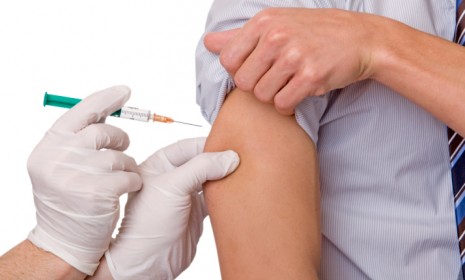Coming soon: A vaccine to help smokers quit?
A new method effectively nixes the high smokers experience after puffing on a cigarette — by attacking nicotine with the body's own antibodies

A free daily email with the biggest news stories of the day – and the best features from TheWeek.com
You are now subscribed
Your newsletter sign-up was successful
Forget the patches, the electronic cigarettes, the nicotine gum: Pretty soon quitting smoking could be as simple as getting one single shot. Researchers have created a vaccine that floods the body with an antibody that stops nicotine from reaching the brain, rendering the relaxing effects of cigarettes ineffective. Experts believe this could pave the way for new treatments that help smokers kick the bad habit for good. Here's what you should know about the vaccine:
How does it work?
The vaccine tricks the body into creating antibodies that attack nicotine as soon as it enters the system, effectively making it impossible to experience that "high" you get from a cigarette. Its creators used a harmless virus to sneak instructions for making special nicotine-targeting antibodies into the liver, kind of like a "Trojan horse." Once those cells were "infected" by the virus, they began to produce a protein that targeted the cancer-causing chemical. "It's sort of like having Pac-Man floating around in the blood," says researcher Ronald G. Crystal of Weill Cornell Medical College in New York.
The Week
Escape your echo chamber. Get the facts behind the news, plus analysis from multiple perspectives.

Sign up for The Week's Free Newsletters
From our morning news briefing to a weekly Good News Newsletter, get the best of The Week delivered directly to your inbox.
From our morning news briefing to a weekly Good News Newsletter, get the best of The Week delivered directly to your inbox.
How effective is the vaccine?
When tested on mice, just one vaccine was enough to last their entire lives. The mice stopped showcasing the "heart-rate slowdown" or "blood pressure drop" associated with nicotine, says LiveScience, and demonstrated an 85 percent decrease in the level of nicotine in their head. "As far as we know, it's safe to use in humans," says Crystal. "Based on results from other studies with this class of viruses, we'd expect them to function forever."
Haven't scientists developed smoking vaccines before?
A few similar options are already available, but those treatments involve injecting antibodies directly into the blood. After a few weeks, the antibodies disappear, and the nicotine-fighting effects diminish. This new method is different because the body continues producing more of these specialized soldier cells long after the shot has been administered.
A free daily email with the biggest news stories of the day – and the best features from TheWeek.com
Will this really help people quit?
It's important to note that the antibodies don't actually get rid of a lifelong smoker's nicotine cravings, but makes it nearly impossible for them to satisfying their urges with tobacco. The next step is to continue testing the product on animals to confirm its efficacy before they move on to humans.
Sources: BBC, LiveScience, WebMD